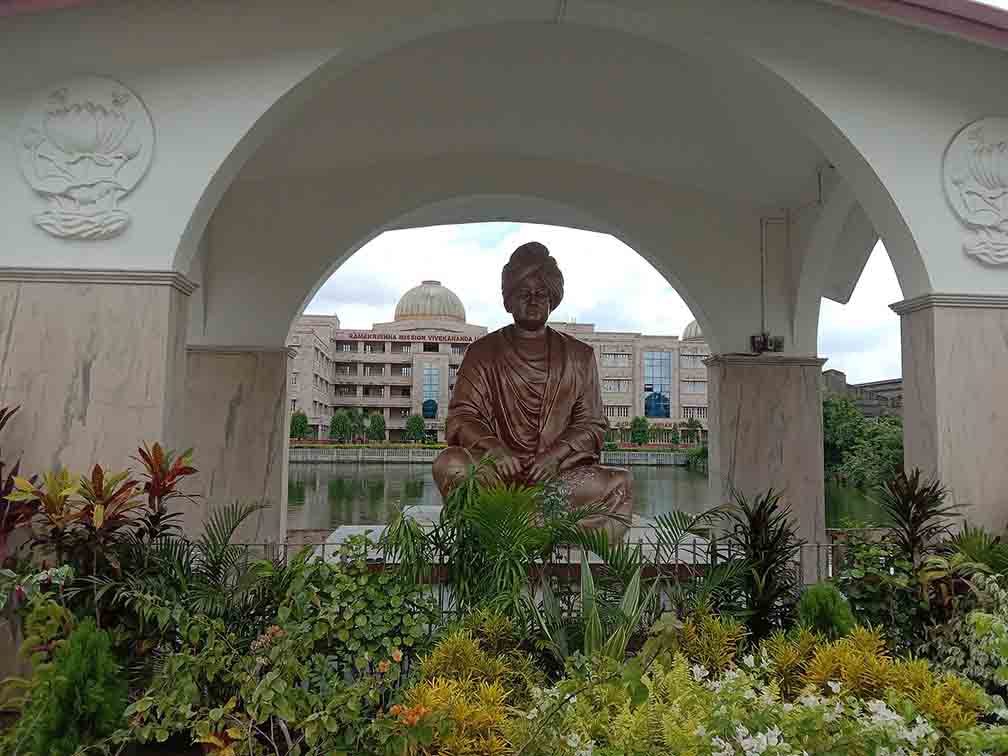
On September 11, 1893, a momentous event unfolded that would reverberate through history, reshaping the global understanding of Hindu philosophy and sparking a new era of interfaith dialogue. Swami Vivekananda, a relatively unknown monk from India, rose to address the World’s Parliament of Religions in Chicago, beginning with the words, “Sisters and Brothers of America.” This simple yet profound greeting captivated his audience and introduced the West to the depths of Indian spirituality, marking a pivotal chapter in religious discourse.
The Historic Journey to Chicago
Swami Vivekananda’s journey to the West was not born of careful planning but of divine destiny. Encouraged by his followers and patrons who believed in the universality of his message, Swami Vivekananda embarked on a voyage to the United States in 1893. His mission was clear: to share the profound teachings of Hinduism with the world and to demonstrate that India, too, had a spiritual treasure to offer. With the financial support of his admirers, he crossed the seas to present Hindu philosophy to an international audience.
A Parliament of Faiths
The World’s Parliament of Religions was part of the larger World’s Columbian Exposition, a grand event organized to celebrate the 400th anniversary of Christopher Columbus’s arrival in the New World. It was a gathering of representatives from various religious traditions, offering a platform for mutual understanding and respect. Amidst this assembly of global faiths, Swami Vivekananda’s voice resonated with a clarity and depth that set it apart.
The Chicago Address That Shaped the West
In his address, Swami Vivekananda spoke of universal tolerance, acceptance, and the harmony between all religions. He urged his audience to reject religious intolerance and dogma, emphasizing that every faith is a valid path to the divine. His words struck a chord, leading to a standing ovation that lasted several minutes—a testament to the power and relevance of his message. Swami Vivekananda presented Hinduism not just as a religion but as a way of life that embraced all paths, an inclusive philosophy that transcended boundaries.
Impact and Legacy
The impact of Swami Vivekananda’s speech was immediate and profound. Almost overnight, he became an international sensation, with newspapers across the United States and Europe praising his oratory and his powerful message. His address laid the foundation for the spread of Vedanta and Yoga in the West, introducing Indian spirituality to a new audience and forever changing the course of Western thought.
The Chicago Address is regarded as one of the greatest speeches in modern history. It continues to inspire generations, reminding us of the universal values of tolerance, peace, and coexistence. But the legacy of Swami Vivekananda’s words extends beyond spiritual discourse—it also highlights the profound connection between science and spirituality.
Swami Vivekananda’s Vision: Science and Spirituality
As we reflect on Swami Vivekananda’s contributions, it is essential to consider his understanding of Hinduism as not just a religion, but a scientific and holistic way of life. His influence extended beyond spiritual awakening to the advancement of scientific education in India—a vision he shared with the pioneering industrialist Jamsetji Tata.
In an unexpected meeting on May 31, 1893, during a voyage to Chicago, Swami Vivekananda and Jamsetji Tata discussed the deep scientific roots within Hinduism and the potential for India’s future. Swami Vivekananda emphasized that Hinduism’s true essence lay in its scientific approach to life, a perspective that resonated deeply with Tata. This conversation sparked a shared vision for an India where science and spirituality could coalesce for the nation’s prosperity.
Swami Vivekananda’s belief that true progress could be achieved by integrating scientific knowledge with spiritual wisdom inspired Tata to consider establishing a research institute in India. In a letter dated November 23, 1898, Jamsetji Tata expressed his admiration for Swami Vivekananda’s views and sought his guidance in creating an institute that would foster scientific research rooted in Hinduism’s ascetic tradition. Although deeply involved in the establishment of the Ramakrishna Mission, Swami Vivekananda supported Tata’s vision, leading to the birth of the Indian Institute of Science (IISc) in 1909. This institution remains a testament to Swami Vivekananda’s belief that Hinduism and science are not mutually exclusive but complementary paths to understanding and improving the world.
A Lasting Influence
Swami Vivekananda’s Chicago Address and his broader vision continue to influence both spiritual and scientific thought worldwide. His message of universal acceptance, combined with his belief in the harmony of science and spirituality, remains as relevant today as it was over a century ago. His legacy lives on in the ongoing dialogue between cultures, religions, and disciplines, reminding us that the pursuit of knowledge—whether spiritual or scientific—can unite humanity in its quest for truth.
As we commemorate the anniversary of Swami Vivekananda’s Chicago Address, we are reminded of the timeless wisdom of Hindu philosophy and its capacity to bridge cultural and religious divides. His words were not just a moment in history but a —- of hope for a future where spirituality and science, East and West, coexist in harmony. Swami Vivekananda’s legacy continues to inspire millions, guiding toward a world where the pursuit of truth, in all its forms, is a shared endeavor.
(The writer is an author and columnist. Her latest book is Blood in the Sea: The Dark History of Hindu Oppression in Goa)